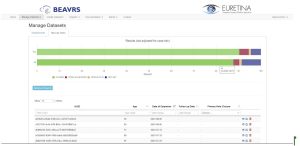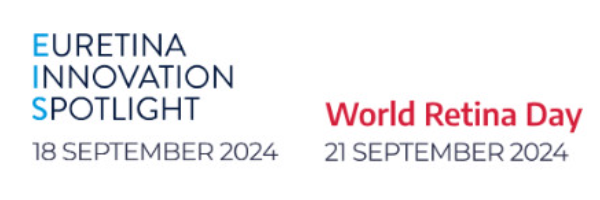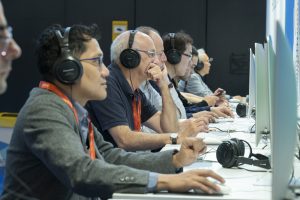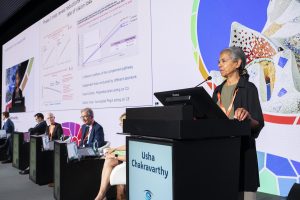Gisbert Richard lecturer reviews findings from studies using the Euretina/BEAVRS database, provides perspectives on their relevance, and offers a glimpse into the future use of artificial intelligence
The Euretina/BEAVRS (British and Eire Association of Vitreoretinal Surgeons) database was created in 2011 to collect preoperative and outcomes data for rhegmatogenous retinal detachment (RRD) and macular hole (MH) procedures that vitreoretinal surgeons could use for revalidation and audit (see Fig 1). The database is also providing a valuable resource for conducting studies that are having an impact on patient care.
Delivering the Gisbert Richard lecture, David Yorston, FRCOphth will focus on lessons learned from these studies so far.
“Currently more than 90 vitreoretinal surgeons have contributed data from more than 15,500 RRD cases and over 5,000 macular holes,” said Dr Yorston, who will begin his talk with a brief overview of the database.

Thus far, nine articles have been published in the peer reviewed literature reporting findings from studies done using Euretina/BEAVRS database data, and more are in preparation. Dr Yorston will discuss these investigations by dividing them into three broad headings, beginning with studies relating to phenotype.
Secondly, he will review findings from studies investigating outcomes for RRD and MH and their predictors. As an example, he will discuss research showing that a majority of patients operated on for RRD had a low risk (<10%) for anatomical failure, while only 10% to 15% of patients were considered high risk with a 25% or greater chance of redetachment within 6 months.
“Our research identified variables that predict the surgical outcome, but many are unmodifiable factors. Yet, the ability to stratify outcome risk has value for surgeons, patient counseling, planners designing clinical trials of investigational treatments, and decision-making on the use of such treatments if they become available.”
The third category of research focuses on evaluating specific interventions. Although information in the Euretina/BEAVRS database does not offer a source for randomised controlled studies, it can be used to conduct case-controlled trials in matched patient cohorts. Dr Yorston will discuss the most recent publication from the Euretina/BEAVRS Outcomes group that demonstrated improved outcomes in RRD surgeries performed using heavy silicone oil compared to conventional light silicone oil.
“Considering the cost, it is unlikely that a randomised controlled trial comparing these endotamponades will ever be completed. The findings from a case-controlled trial such as ours is not perfect evidence, but it may well be the best evidence that we get,” Dr Yorston said.
He will also mention a first foray into the application of artificial intelligence to analyse data in the Euretina/BEAVRS database in which preoperative RRD images were used to develop a model for predicting the surgical outcome.
Dr Yorston will encourage attendees to participate in the Euretina/BEAVRS database. Not only will surgeons benefit from easy access to the outcomes data they need for personal audits, but they can also seek permission to use the Euretina/BEAVRS database to perform their own research studies.
“Surgeons should know that the data are completely anonymised and secure. However, the main message about the database is that it is a collaborative exercise. In a world that has become deeply polarised and divided, it is important to see how much we can achieve when we work together,” Dr Yorston said.
Dr Yorston will deliver the Gisbert Richard Lecture at 14:45 CEST on Saturday 21September in the Grand Auditorium

























































































































